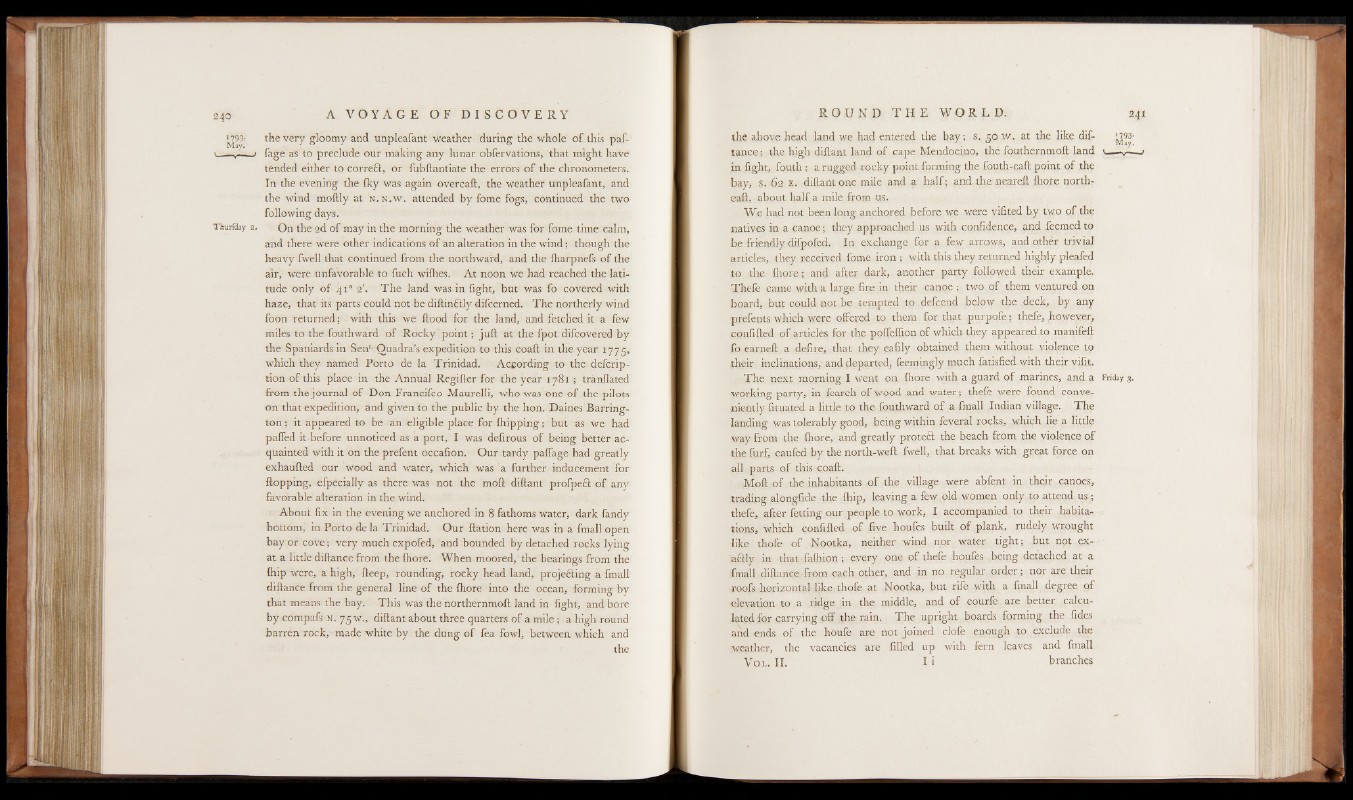
|793- the very gloomy and unpleafant weather during the whole of. this paf-
<.__55__1 fage aS to preclude our making any lunar obfervations, that might have
tended either to correft, or fubftantiate the errors of the chronometers.
In the evening the fky was again overcaft, the weather unpleafant, and
the wind moftly at n . n .w . attended by fome fogs, continued the two
following days.
Thurfday 2. On the 2d of may in the morning the weather was for fome time calm,
and there were other indications of an alteration in the wind; though the
heavy fwell that continued from the northward, and the lharpnefs of the
air, were unfavorable to fuch wilhes. A t noon we had reached the latitude
only of 41“ 2'. The land was in fight, but was fo covered with
haze, that its parts could not be diftinfitly difcerned. The northerly wind
foon returned; with this we Hood for the land, and fetched it a few
miles to the fouthward of Rocky point; juft at the fpot difcovered by
the Spaniards in Senr- Quadra’s expedition to this coaft in the year 1775,
which they named Porto de la Trinidad. According to the defcrip-
tion of this place in the Annual Regifter for the year 1781 ; tranflated
from the journal of Don Francifco Maurelli, who was tone of the pilots
on thatexpedition, and given to the public by the hon. Daines Barrington
; it appeared to be an eligible place for lhipping; but as we had
pafled it before unnoticed as a port, I was defirous o f being better acquainted
with it on the prefent occafion. Our tardy paffage had greatly
exhaufted our wood and water, which .was a further inducement for
Hopping, efpeeially as there was not the moll diftant profpeft o f any
favorable alteration in the wind.
About fix in the evening we anchored in 8 fathoms water, dark fandy
bottom, in Porto dela Trinidad. Our ftation here was in a fmall open
bay or cove; very muchexpofed, and bounded by detached rocks lying
at a little diftance from the Ihore. When moored, the bearings from the
fhip were, a high, fteep, rounding, rocky head land, projefting a fmall
diftance from the general line of the Ihore into the ocean, forming by
that means the bay. This was the northernmoft land in fight, and bore
by compafs N. 75 w., diftant about three quarters of a mile ; a high round
barren rock, made white by the dung of fea fowl, between which and
the
the above head land we had entered the b a y; s. 50 w. at the like dif- jM3-
tance; the high diftant land of cape Mendocino, the fouthernmoft land j-----—
in fight, fouth; a rugged rocky point forming the fouth-eaft point of .the
bay, s. 62 e . diftant one mile and a half; and. the neareft Ihore north-
eaft, about half a mile from us.
We had not been long anchored before we were vilited by two o f the
natives in a canoe; they approached us with confidence, and feemed to
be friendly difpofed. In exchange for a few arrows, and other trivial
articles, they received fome iron ; with this they returned highly pleafed
to the Ihore; and after dark, another party followed their example.
Thefe came with a large fire in their canoe ; two of them ventured on
board, but could not be tempted to defcend below the deck, by any
prefents which were offered to them for that purpofe; thefe, froweyer,
confifted o f articles for the poffeflion of which they appeared to manifeft
fo earneft a defire, that- they eafily obtained them without violence to
their inclinations, and departed, feemingly much fatisfied with their vifit.
The next morning I went on Ihore with a guard o f marines, and a Friday 3.
working,party, in fearch o f wood and water; thefe were found conveniently
fituated a little to the fouthward o f a fmall Indian village. The
landing was tolerably good, being within feveral rocks, which lie a little
way from the Ihore, and greatly protect the beach from the violence o f
the furf, caufed by the north-weft fwell, that breaks with great force on
all parts of this coaft.
M o fto f the inhabitants of the village were abfent in their canoes,
trading alongfide the fillip, leaving a few old women only to attend us ;
thefe, after fetting our people to work, I accompanied to their habitations,
which confifted of five houfes built of plank, rudely wrought
like thofe of Nootka, neither wind nor water tight; but not ex-
aftly in that falhion; every one of thefe houfes .being detached at a
fmall diftance from each other, and in no regular order; nor are their
roofs horizontal like thofe at Nootka, but rife with a fmall degree of
elevation to a ridge in the middle, and of courfe are better calculated
for carrying off the rain. The upright boards forming the fides
and ends of the houfe are not joined clofe enough tp exclude the
weather, the vacancies are filled up with fern leaves and fmall
V ol. II. I i branches